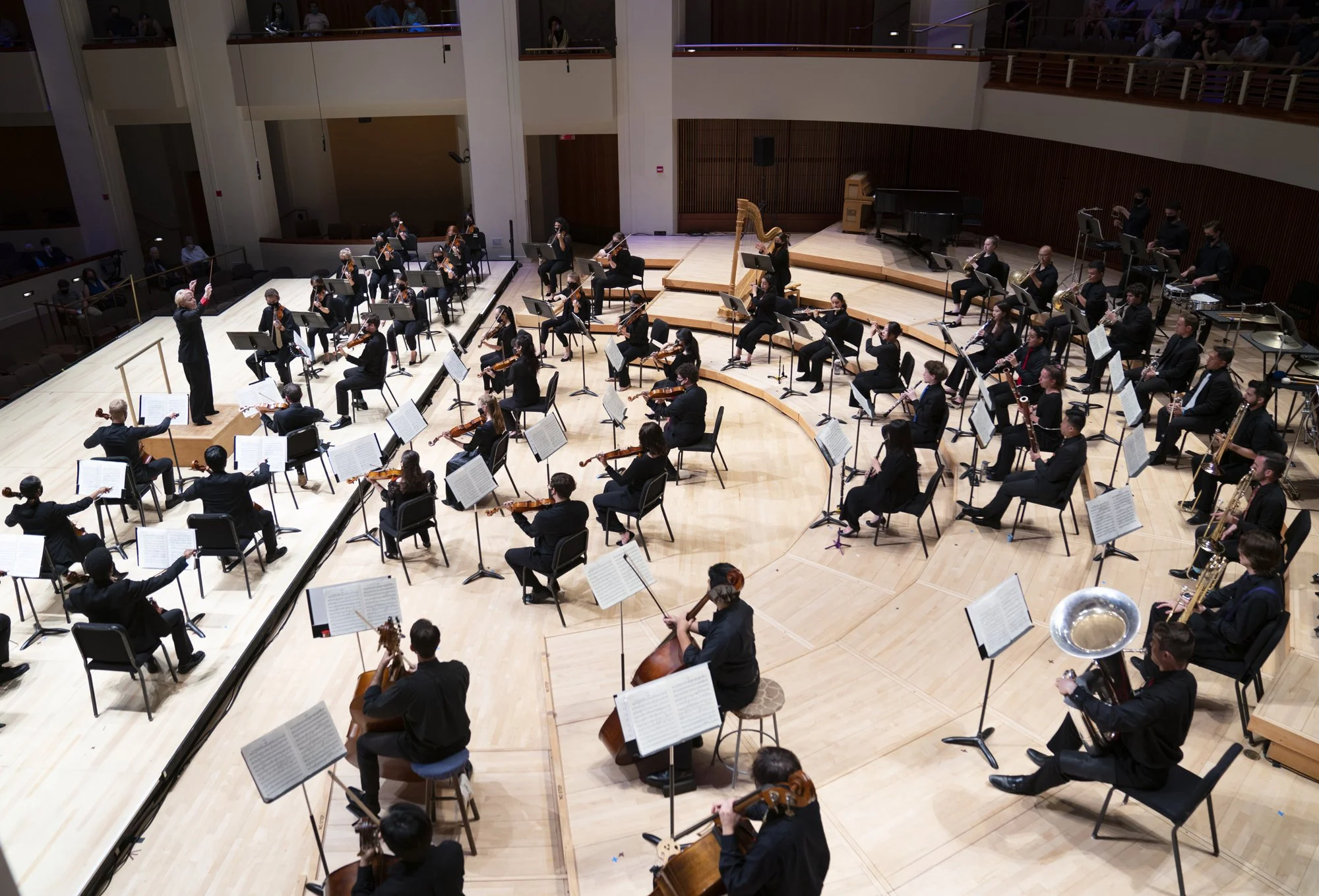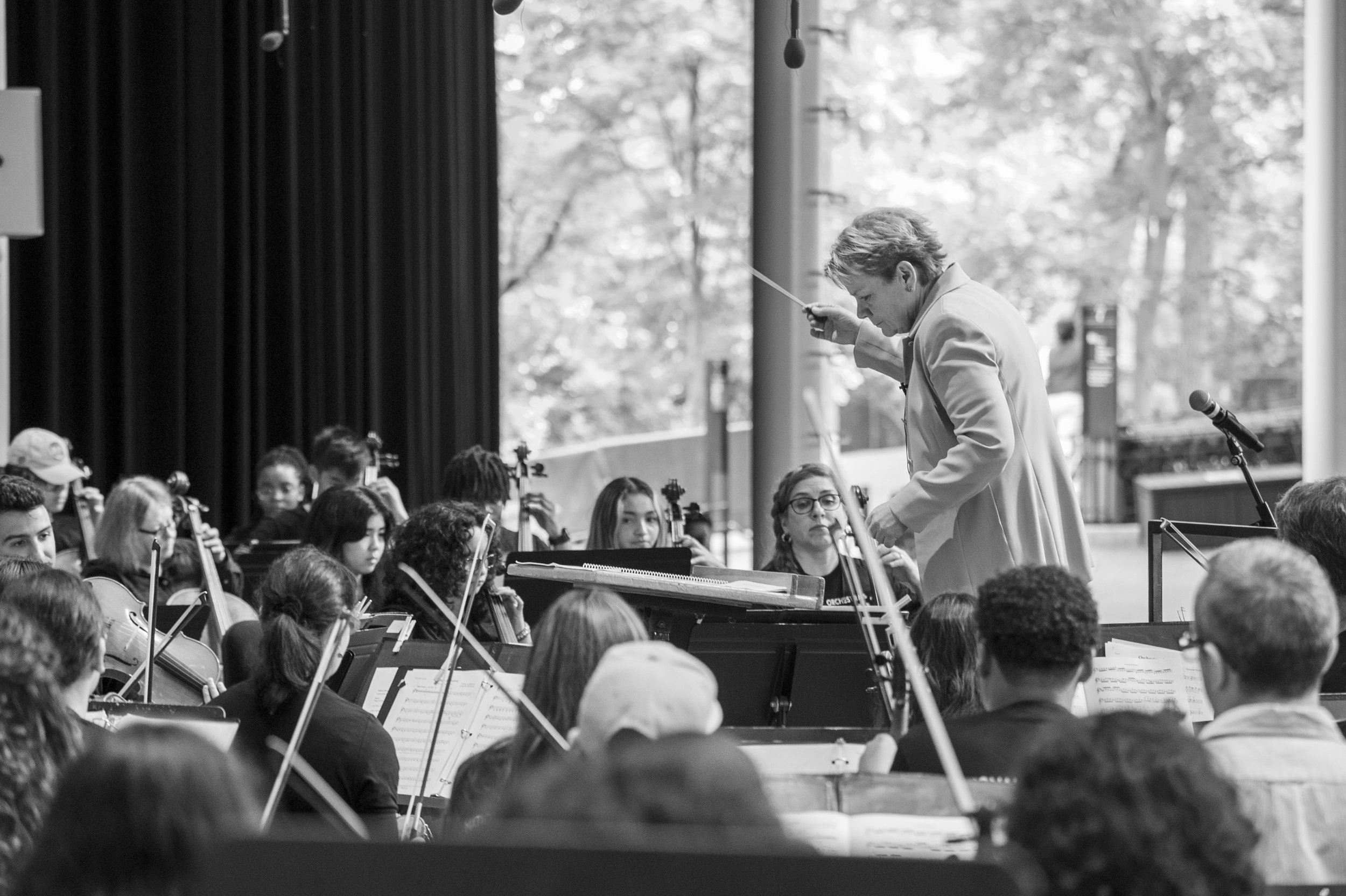By Wynne Delacoma
Playing in an orchestra is, essentially, a team sport, one that many fledgling musicians dream about.
But unlike baseball or soccer, it requires hours of solitary practice before “team play” begins. Sometimes trying to learn an instrument and performing only occasionally with local classmates can feel like a lonely slog. Budding athletes can plug into a vast network of local, regional, and national sports competitions, meets, and workshops that keep them excited about their sport. Little on that scale exists for young musicians.
Marin Alsop, Ravinia’s Chief Conductor, is deeply invested in providing the support—and camaraderie—children need to stay interested in orchestral learning and careers. This summer, she presides over the second National Seminario Ravinia, a four-day immersion in orchestral music for 130 students aged 11 to 18. Starting July 7, the kids will rehearse repertoire for a concert July 10 conducted Alsop and Jessica Altarriba, Seminario’s lead conductor. Among other works, they will perform Sibelius’s Finlandia side-by-side with pre-professionals in their 20s from the National Orchestral Institute + Festival. Alsop has been artistic director of the NOI+F, founded at the University of Maryland in 1987, since 2020.
“This is all about connection and feeling that you have a bigger community.” Alsop said in an interview during her recent run conducting John Adams’s El Niño in her Metropolitan Opera debut. “It’s about getting kids with like interests to connect, to meet kids from different backgrounds, different parts of the country, different cultural origins, everything. Because the more diversity and connections we can make, I think the richer the culture.”
National Seminario Ravinia was inspired by the success of El Sistema, the legendary training program for elementary and high-school musicians founded in Venezuela in 1975 that now informs programs operating in more than 50 countries. Ravinia’s Reach Teach Play, which launched an El Sistema–style program more than a decade ago, introduced the National Seminario last summer. There are no formal auditions; El Sistema–style programs are invited to nominate their students to participate. Last year’s three-day Seminario drew 126 young musicians from 26 such organizations in 15 states and Canada. This year’s students come from 43 programs in 19 states, Canada, Mexico, Sweden, and Greece.
Marin Alsop brings focus to a National Seminario Ravinia side-by-side rehearsal with the 2023 students and Chicago Philharmonic mentors.
“I know that everyone was really happy about the way things went last year,” said Alsop. Jonathan Rush, an Alsop protégé, was the inaugural Seminario’s lead conductor. “We were content with the interest level, and that’s why it’s been expanded this year.”
Alsop knows a thing or two about getting kids interested in classical music. OrchKids, the after-school program she launched in 2008 while music director of the Baltimore Symphony Orchestra, became a national model for bringing music to under-served elementary school children. (Naturally, OrchKids is among those 43 participating programs.) This year’s Seminario showcases Alsop’s gift for mentoring at a different level. She’s particularly proud that Seminario students will spend time with the slightly older NOI players. Students will stay in Lake Forest College dormitories, and in addition to sectional and orchestral rehearsals, they’ll travel to downtown Chicago for an architectural boat tour.
“The National Orchestral Institute musicians are pre-professionals, roughly between the ages of 25 and 28,” Alsop said. “The younger kids will have mentors who are very close to their own age, which I think really will be magical. And not only that, we’ve engaged a dozen or so Chicago Symphony members to come and work with the young National Institute pre-professionals. So we have a sort of complete-circle mentoring.”
In addition to conducting Finlandia for the orchestra uniting the Seminario students and their mentor musicians, Alsop will close the July 10 concert with Mahler’s Symphony No. 1 featuring only the NOI players. “A piece like Finlandia they can do side-by-side,” she said. “It’s not that hard. But I’m eager to have the younger kids observe the Mahler. I want them to see these kids who are just a few years older than they are. ‘Look what level you could be at too.’
Alsop conducting musicians of the National Orchestral Institute
“I think that mentorship is very undervalued,” she continued, “though maybe underrated is a better word for it. It’s so important that young people have advisors, inspiring professionals, older people to look up to. I try to inspire people to be a mentor in everyday life. Sometimes it just takes one thing that you say that’s thoughtful to a young person that can really change the trajectory of their entire career.
“For me, at this point, I’m not necessarily ‘getting something out of ’ mentoring,” Alsop said. “It’s trying to give back a little bit. I feel like I really want these young people to maintain their passion and enthusiasm for being orchestral musicians. And the more I can invest in helping achieve that goal, the better our profession will be.”
Conceptually, there’s a strong connection between Alsop’s hopes for Seminario and the repertory she’s chosen for July 10 and her three sets of CSO concerts: July 12–13, 20–21, and 25–26. Outer space and distant, mysterious worlds are recurring themes. The focus of Ravinia’s third annual Breaking Barriers Festival, scheduled July 26–27, is women leaders in music and outer space.
With luck, during their four days at Ravinia, Seminario musicians will expand their personal and musical horizons and encounter vistas they might never have imagined. Their July 10 repertory will encourage dreaming big. Sibelius wrote Finlandia in 1899 when tsarist Russia ruled the country and Finns could only dream of Finland becoming a free, politically independent state. “Great Movie Adventures,” an arrangement of John Williams film music, will conjure outer space with themes from Star Wars and E.T. The program’s newest work is Distant Worlds by Brian Nabors, a young Black composer based at Louisiana State University. He originally composed it for smaller forces but has rescored it for the larger National Seminario Ravinia orchestra.
“There will be kids at many, many different [performance] levels,” said Alsop, “so we wanted to find a piece that all levels could join in.”
Alsop kicks off her CSO concerts July 12 with an all-American program: a suite from Aaron Copland’s ballet Appalachian Spring, Samuel Barber’s Knoxville: Summer of 1915, Charleston by James P. Johnson, and Gershwin’s Rhapsody in Blue, which turns 100 this year. Dream worlds are a focus July 13 with two CSO premieres: Go where the wind takes you by Ukrainian composer Iryna Aleksiychuk and Four Spirits by guest cellist Abel Selaocoe. The concert closes with Beethoven’s Fifth Symphony.
On July 20 Alsop conducts Mahler’s eloquent Symphony No. 9, while Chopin’s Piano Concerto No. 1 leads off the July 21 CSO concert. Fantasy worlds reemerge July 21 with Richard Strauss’s tone poem Don Juan and Suite No. 2 from Maurice Ravel’s ballet Daphnis et Chloe.
Two mythic creatures of the air, Icarus and the Firebird of Russian folklore, bookend the July 25 program: the concert opens with CSO premiere of George Walker’s Icarus In Orbit and closes with Stravinsky’s The Firebird Suite. Also scheduled are Bernstein’s Symphonic Dances from West Side Story and Mendelssohn’s vaunted E-minor Violin Concerto.
Outer space is the entire focus on July 26, the central concert of Ravinia’s Breaking Barriers Festival. Along with Holst’s familiar The Planets, Alsop conducts the CSO premiere of Australian composer Amanda Lee Falkenberg’s The Moons Symphony Suite. Alsop has recorded the work with the London Symphony Orchestra, and Ravinia’s performance will include videos designed to accompany the score.
As though foretelling Ravinia’s 2024 focus on the mysteries of the universe, Alsop and Falkenberg connected during the Covid pandemic, a time when normal life on Planet Earth seemed cosmically disrupted.
“Her dream was to have me conduct,” said Alsop, “so she got my email and contacted me. I had a look at the score, and I thought, ‘Great, okay super.’ During the pandemic I had time; it was fantastic to have that time available.”
Time and space—as always, crucial ingredients for any dream.
_________________
Wynne Delacoma was classical music critic for the Chicago Sun-Times from 1991 to 2006 and has been an adjunct journalism faculty member at Northwestern University. She is a freelance music critic, writer, and lecturer.




